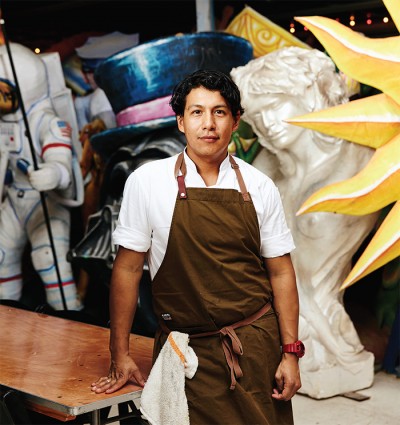
Photo: Daymon Gardner
Mario Rodriguez ’02
Pop-up dining presents chefs with some interesting challenges, especially if the fleeting event takes place in an unconventional setting—say, on a rooftop where helicopters land or in a New Orleans warehouse where racy floats for the Mardi Gras parade are housed. Mario Rodriguez ’02, culinary director for the pop-up dining club Dinner Lab, has worked in both.
Sometimes no running water is available. Or maybe no electricity. Just like on a reality TV show, troubles arise. Once mosquitoes swarmed a location. Another time the space flooded with two feet of water. “The solution is the same,” says Rodriguez in response to the question, what do you do? “Think clearly and come up with a logical solution. We need to execute, no matter what happens.”
Dinner Lab itself brings some interesting twists to pop-up dining. Available in 33 markets, the eating experiment asks people to become members in their chosen city. Members then receive notices of pending dinners, to which they can buy tickets. The day before the event, its location is revealed. Diners take an active role in the evening, critiquing what they eat. The feedback is compiled and shared with the chefs with the intention of improving their approach and menu concept.
In his day-to-day role, Rodriguez helps launch the club in new markets, handling all the culinary operations, such as finding sites, ordering equipment, hiring and training employees, collecting data from the diners, and managing the associated finances. “My job is to set up operations in a city, run a successful opening night, and help maintain the market going forward,” says Rodriguez.
An experienced chef who has worked for restaurants in New York City and New Orleans, Rodriguez also often serves as executive chef for opening night. His two most successful Dinner Lab dishes are sancocho de pescado, a fish stew with “heat” inspired by his father’s Colombian heritage, and a Malaysian-inspired red chili clam dish that draws on flavors he enjoyed while living in Southeast Asia.
Food has been a love for Rodriguez since he was a child, cooking rice and baking meringues with his Ecuadorian grandmother. He attended Babson instead of culinary school on the advice of his parents and a high school counselor. “She told me you can always go to culinary school at any point. But if you have a business degree, you’ll get a leg up on everyone else,” he says.
Six years after graduating from Babson, Rodriguez earned his degree from The French Culinary Institute (now the International Culinary Center). Rodriguez says he relies on knowledge from both schools to do his job. “I think I have a broader perspective than some chefs,” he says. “In culinary school, they show you the right technique, how to taste and adjust flavors and thrive in a fast-paced environment. But business school allowed me to pick my head up and look at the big picture.”—Donna Coco
